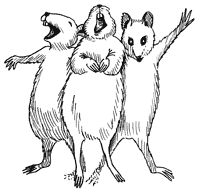STRANGE BUT TRUE- Mouse music: What's that sound in the cupboard?

DRAWING BY DEBORAH DERR McCLINTOCK
Q. Birds sing, whales sing, but what's that singing late at night out in the kitchen cupboard? –B. Potter
A. The singing of mice is well-authenticated and sounds like the voice of a weak canary, their songs lasting up to ten minutes, says Juliet Clutton-Brock in A Natural History of Domesticated Mammals. Mus domesticus, the house mouse, has lived for thousands of years among people, said by the Roman Pliny to bring good luck if white but if a singer, to "interrupt the auspices." In spite of the male's stink, house mice have been kept as pets for at least 300 years, probably a lot longer than tamed rats.
Q. "Vanishing Twin Syndrome" (VTS) refers to a) the tendency for twins to move apart and lose contact; b) one twin dying long before the other; c) poor birth records showing far fewer twins born than actually are; d) many embryonic twins disappearing long before being born, often without leaving a trace. –U.G. Turner
A. Amazingly d), with as many as 1 in 8 pregnancies beginning as twin conceptions though only 1 in every 80 live births results in twins, says Scott Forbes in A Natural History of Families. Most twin gestations undergo "brood reduction," which occurs early and out of sight, before the embryos technically become fetuses at eight weeks. Some but not all vanishing twins can be detected with ultrasound, and in fact, it wasn't until the use of early sonograms in the 1980s that the scope of VTS became apparent.
What happens is that one twin spontaneously aborts, usually during the first trimester, with the fetal tissue absorbed by the other twin, the placenta, or the mother, says Pamela Prindle Fierro in Your Guide to Parenting of Multiples. So when Mom-to-be comes back for a second exam six weeks later, only one heartbeat is now heard via Doppler scan. A follow-up ultrasound confirms only one fetus. Generally when VTS occurs early, neither Mom nor the remaining fetus requires medical treatment, and the singleton experiences a normal delivery.
Q. For this, the Spaniards say "patata" (potato), the Danes "appelsin" (orange), the Swedes "omelett," the Finns
"maikku" (a kind of fish), the Koreans "kim chi" (cabbage), the Poles "dzem" (marmalade), and the Chinese "qiezi" or "ch'ieh tzu" (eggplant). Some Australian households have begun to use the word "money," the Japanese use the English word "whisky," the Czechs used to say "syr" (cheese) but lately have opted for "fax," better befitting their modern republic. What do most speakers of English say? –J. Carpenter
A. They say "say cheese," of course, a photography practice that originated in British public schools circa 1910. All the above are used to tease the mouth into a fetching facsimile of a smile, for those subjects a bit camera-shy, says Angus Trumble in A Brief History of the Smile. Malays and some other Muslims, Gypsies, North American Indians, and certain tribes of Aboriginal Australians have traditionally avoided having their photos taken, so they say nothing at all.
Q. What's one Scrabble-bot's new trick to make human opponents even easier to beat? –A. Pontuso
A. Beating people at the game was already no contest for computer programs (that can easily memorize entire dictionaries) when Eyal Amir and Mark Richards of the University of Illinois taught a robot how to "play dirty." The program can predict which letter tiles other players hold and use this info to choose moves that block a high-scoring word from being played, says New Scientist magazine. The program begins by eliminating the tiles already played, then narrows down the possibilities by assuming those left on an opponent's rack do not include any letters that could have been used for a higher score on previous moves. Using this "opponent modeling" so bettered the program's game that it now beat Quackle, one of the best conventional Scrabble programs.
And more: Because the program's behavior is more human-like, says Amir, it can serve as a useful tool for training people to compete against other people, as in "Bot you can't top that move!"
Send strange questions to brothers Bill and Rich at [email protected].
#